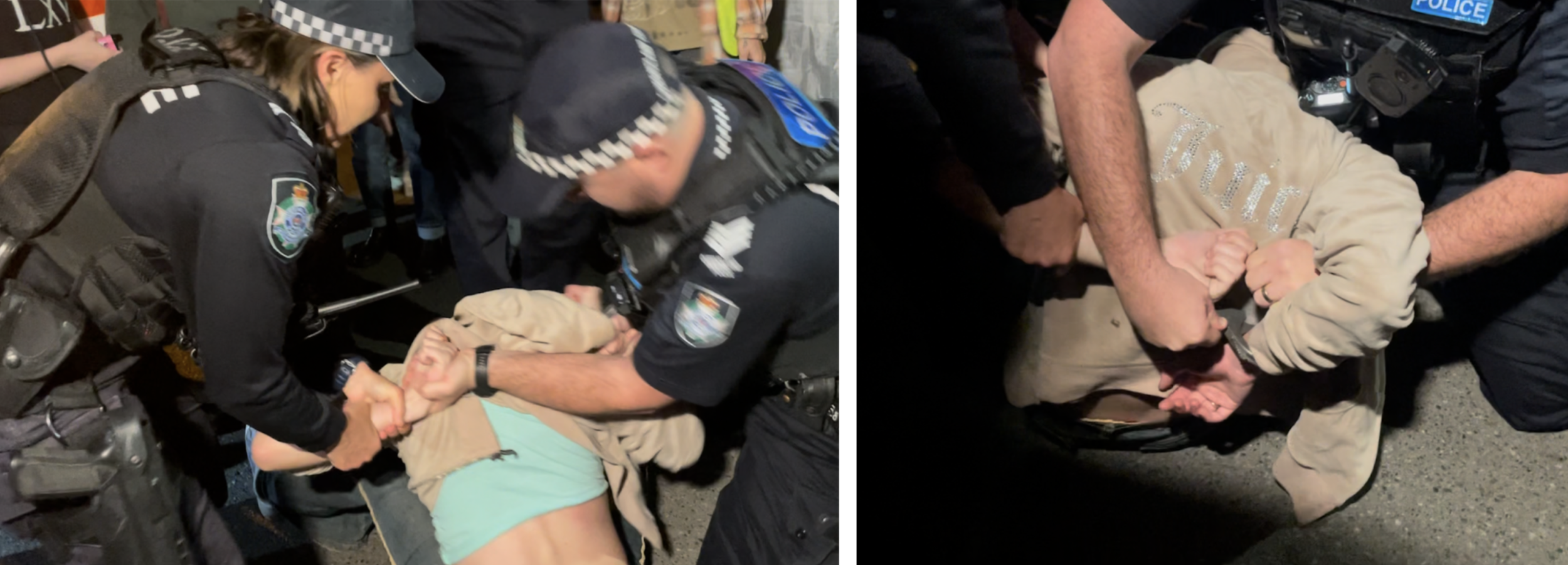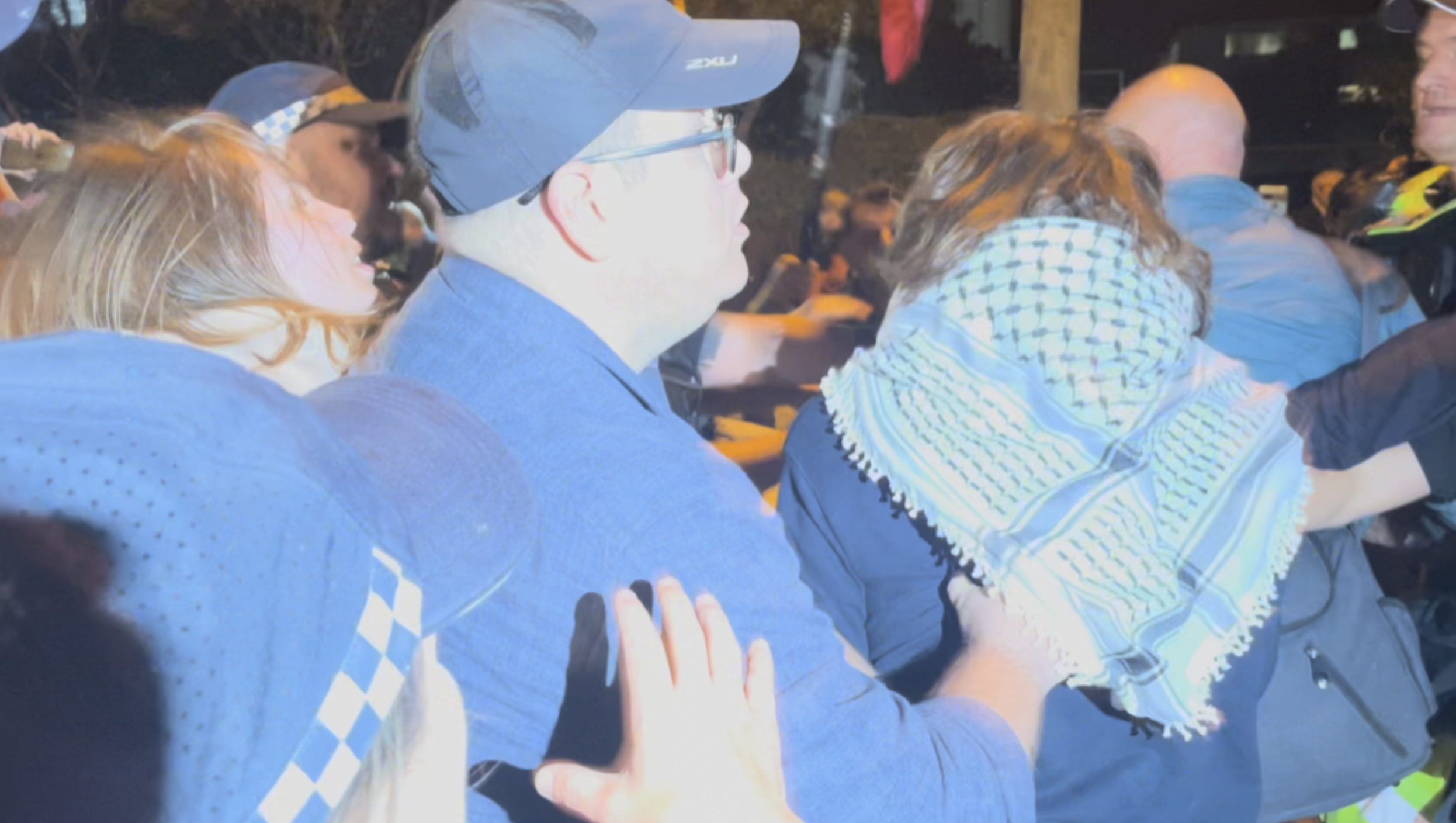Legal Observer Report: Policing of protests outside the Labor Party “True Believers” fundraiser at the Greek Club
12 July 2024
Action Ready has serious concerns about the excessive use of force and systematic surveillance by the Queensland Police Service during a protest in response to an Australian Labor Party Fundraiser at the Greek Club on 12 July 2024. Despite the protest being authorised under the Peaceful Assembly Act 1992 (Qld), police used aggressive tactics, including kettling, physical restraint, and unjustified arrests, while also failing to provide necessary medical assistance to a person arrested. Additionally, many officers did not wear identification tags, impeding accountability and raising further human rights concerns.
Action Ready fielded a team of seven (7) Legal Observes for the protest outside the Australian Labor Party Fundraiser, with Prime Minister Anthony Albanese in attendance, held at the Greek Club in West End, Brisbane between approximately 5:00pm and 9:30pm on 12 July 2024 (the Protest). Legal Observers were present at the site (being the front entrance located on Edmonstone Street) and at other entrances on adjoining streets (including Besant Street and Browning Street) for the duration of the Protest for the purpose of observing, monitoring and recording the conduct of members of the Queensland Police Service (QPS) and their interactions with protesters. Legal Observers noted at least 40 QPS officers present, including the Public Safety Response Team (PSRT), and witnessed one arrest.
This report reflects and assesses the resultant impacts of the actions and tactics of QPS officers towards protesters at the Protest and in general, and relates these to considerations of human rights, health, safety and other relevant considerations. This report draws upon the on-the-ground observations of Legal Observers and other persons present, as well as photo and video evidence.
Surveillance of protesters & systematic information gathering
Our legal observers have previously noted QPS officers at protests and rallies with printed booklets that appear to contain photos of and information about individuals. This was observed again on 12 July 2024, as per the below photograph taken by a legal observer.
Two police officers checking a booklet containing photos and information about individuals, presumably protesters
The distinct impression is that QPS has been systematically collecting information about individuals who are known to attend protests and that officers come to events with the intention of identifying these people, and potentially adding to the information already on record.
As we have previously noted, the targeted collection of information on protesters is unjustified and has the effect of intimidating members of the public merely for engaging in peaceful assembly. In our view, any systematic information gathering about protest attendees breaches Queensland’s information privacy principles.
The practice may also unlawfully limit the human rights of attendees, including the right to freedom of expression, peaceful assembly and freedom of association, as well as the right to privacy and reputation, among others. Peaceful assemblies cannot be allowed to be treated as places for police to gather information about the movements, beliefs and opinions of politically and civically engaged people. All people should feel welcome and able to attend protests without the threat of police gathering information about them and their communities.
Excessive use of force
Police officers are required to only use the minimum amount of force necessary to safely resolve an incident. Legal Observers witnessed an arrest which involved excessive levels of force. At approximately 6:00pm, officers arrested a female protester under circumstances that appeared to lack grounds for arrest. The police response was immediately excessive and unnecessarily violent. A police sergeant tackled the protester using a headlock while another officer grabbed the protester’s hair, pushing her head down with significant force and hyperextending her arm backward to apply handcuffs. We are concerned about the use of force in this manner, especially given that a protester previously had their arm broken during an arrest at a protest in Magandjin (Brisbane).
Police hyperextending a protester's shoulder and using handcuffs to make an arrest
The arresting police sergeant recognised that the protester was “overheating” and unable to move herself away from the protest. Police then dragged her about 40 metres to the Edmondstone Street car park of the Greek Club to complete the arrest. Police are obligated to monitor and provide medical assistance to individuals in custody post arrest. However, they did not allow medic teams present to assist the protester, nor did they provide her with water until a legal observer offered their water bottle. This raises serious concerns about the QPS’s failure to meet an adequate standard of care for individuals in custody, especially considering their repeated failures to prevent harm to people in custody.
Police were also generally aggressive with attendees at the protest. During the rally, police officers “kettled” protesters into small areas, using significant force and restraining them against walls to facilitate the entry of fundraiser participants into the Greek Club. This conduct included shoving protesters and legal observers. As a result of police force, a legal observer sustained bruising to their rib cage.
Inappropriate use of directions, powers and use of threats
Legal Observers witnessed multiple instances of inappropriate use of police powers aimed at suppressing participation in protest actions. The protest organisers secured an authorisation under the Peaceful Assembly Act 1992 (Qld) to protest between 6 to 8 pm on Edmonstone Road, meaning attendees should not have faced civil or criminal liability for obstructing a public place while participating in a peaceful assembly that substantially complied with those terms. Despite this authorisation, protesters were threatened with arrest for shouting at attendees. Additionally, one protester was asked to provide their name and driver's licence while on their way to the protest near the Coles on Mollison Street, West End.
Shortly after the authorisation period ended, a Legal Observer was threatened with arrest for public nuisance while standing on the footpath in front of the Greek Club, allegedly for "disrupting the peaceful accord of the business." A person should not be threatened with arrest for peacefully standing on a footpath, even if the authorisation period has ended, particularly in circumstances where peaceful assembly is a human right in Queensland.
When police use powers without proper grounds, it undermines the public’s right to engage in peaceful assembly and erodes their feelings of safety and trust in the QPS.
Removal or obfuscation of accountability measures
Legal Observers observed five police officers who were not wearing badges that displayed their badge number or their name. This is inconsistent with order 12.10.1 of the QPS Management Support Manual which orders that “Police officers are to wear Service issue identification tags on all relevant uniform items including a load bearing vest”. It is obvious that if police officers cannot be identified, they can act with a higher degree of impunity. Research suggests that police officers who wear identification tags are more conscious of the needs of the general public they are interacting with. Nametags, therefore, are an important safeguard that can help ensure individual police are held responsible for their actions.
On multiple occasions police were also observed to fail or refuse to provide their name, rank and station to an individual after exercising a power as a public official in relation to that individual, including when giving instructions to protesters to move.
Legal Observers noted the presence of plain clothes police officers at the protest who made attempts to gather information from protesters, and who then participated in an arrest and contributed to the use of force against other protesters during this same arrest.
A plain clothes officer wearing a 2XU cap using force against protesters to facilitate an arrest
The failure to display identification tags and refusal to provide identification information on request, combined with the use of force by plain clothes police officers, meant that in many instances individual accountability was virtually impossible. This is extremely concerning when viewed in the context of the excessive use of force by police.
Action Ready is a Magandjin (Brisbane)-based collective of lawyers, law students and graduates, community organisers and anyone interested in protection of the right to protest. Our primary functions are to provide community legal education, on ground support and data collection at protests and actions, and to seek accountability where policing practices unjustifiably interfere with the right to peaceful assembly.
We acknowledge the Jagera/Yuggera, Turrbal, Yugarapul and Quandamooka peoples on whose lands and seas we organise. We pay our respect to Elders past and present, and acknowledge the longstanding systems of law and resistance that come before us. Always was, always will be.



